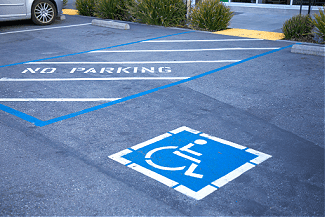Landlords Could Be Sued for Not Providing Parking Spaces

Can a resident who has a disabled person’s parking permit ask for a designated parking space even when there are already designated parking spaces for the disabled?
The short answer is they absolutely can. All property housing providers should be prepared to respond to this kind of request, as it is not uncommon. Unfortunately, many property management companies think that just because they have a couple of publicly accessible spaces on their parking lot, that is all that they need.
Leading to the scenario of a resident stating that the handicap-accessible spots are too far from their unit. Or perhaps because they are publicly available and, as such, are always occupied. Either way, the resident requested a designated spot. You now need to proceed like you would with any other reasonable accommodation request.
Can a resident who doesn’t use a wheelchair ask for a designated parking space?
Just like all reasonable accommodation requests, it has to be open to people with any kind of disability. Remember that not all disabilities may be visible or require an assistive device. However, they still may need access to a designated or accessible parking spot. For example, a person that has heart or lung disease may not need a wheelchair but can only walk short distances.
Once a resident requests an assigned parking spot based on their disability, you need to start your reasonable accommodation process. You need to verify whether they’re disabled. Along with that, you need to determine why that disability results in a need for an assigned parking space. Then you make the determination from there whether to grant the accommodation or not.
If someone has a disabled person’s parking permit, is that all they need to show you that they’re verifying their need for an accommodation?
You can see why some may think this, but it’s a bit more complicated than that. Firstly, it’s important to remember what the requirements are for a verification. The requirements for a verification are that the person meets the definition of disability and that the need for the accommodation has been identified by a third-party professional.
In this instance, the assigning of a designated parking space is related to the disability. This is where it can get tricky. In some states, the requirements to get a disabled person’s parking permit are enough to establish your usual requirement for a reasonable accommodation. However, there are also some states that do not require adequate information. In this case, requiring additional information would be justifiable.
As a result of this, it is imperative that every housing provider know what their state requires. If they are still not certain, then they should also seek legal advice.
If the need for an assigned space has been completed, what are the next steps?
Once the need has been determined, then it’s time to make it happen. The first step would be to determine the type of spot. Does the resident need a standard spot that is closer to their unit, or do they need a handicap-accessible spot? For example, an accessible parking spot would include things like a wider space to utilize mobility aids. It would also include curb cuts for wheelchairs or other assistive device access.
After this is determined, you now have to label the spot to let others know that it is reserved. A best practice is to have it clearly lettered or a sign stating that the spot is permanently reserved. Management also needs to ensure that it is enforced.
Parking spaces can throw up some challenges for housing providers. But training and education, especially as it concerns a protected class, will help you stay fair housing friendly.
Source: Fair Housing Institute















 Accessibility
Accessibility